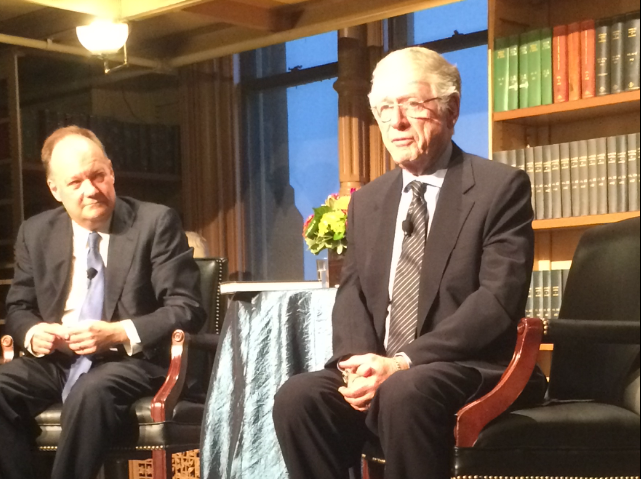Ted Koppel, former anchor of ABC’s “Nightline,” participated in a question and answer session with University President John DeGioia on Feb. 23. The session took place in Riggs Library in front of a crowd of about 50. Koppel primarily discussed his new book, “Lights Out: A Cyberattack, A Nation Unprepared, Surviving the Aftermath,” and took questions from both DeGioia and the audience before holding a book signing.
In his opening remarks, DeGioia discussed Koppel’s career in journalism, including his 25 years on “Nightline,” 42 years with ABC, and his most recent time with the Discovery Channel, beginning in in 2006. DeGioia also said that two Georgetown students interned with Koppel, and one of them, Morrow Willis, a student in the MSFS, passed away from leukemia in 2015. Koppel also mentioned Willis at the end of the talk, and thanked Willis’ parents for being at the event.
DeGioia’s first question concerned the relevance of cyber attacks. Koppel pointed to President Obama and former Secretary of Defense Leon Panetta as two officials who have mentioned the dangers of a “cyber Pearl Harbor.” “When you’re warning of a ‘cyber Pearl Harbor’ you would think that people would pay attention,” said Koppel. “Nobody did.” DeGioia then asked Koppel why this issue in particular grabbed him, and Koppel explained that he believes that the threat of a cyber attack is “arguably the greatest existential threat to our way of life.” He continued that “it’s not a question of if, it’s a question of when.”
Koppel then explained the impacts of a cyber attack on the American electrical grid. “If someone can get into [the system], they have the capacity to take down a huge segment of the grid,” said Koppel. “What that means is, think about it, no light, no cooling, no heating, no banking system, no travel system, no aircraft in the air … in effect it means society as we know it today gets shut down.” Responding to a cyberattack is especially difficult, according to Koppel, because it is hard to find the sources of cyber attacks. He pointed to the fact that it took the FBI two months to officially trace the hack on Sony Pictures back to North Korea as an example of this challenge.
The discussion then moved to how the American people should prepare for such an attack. Koppel said that he would advise government leaders to take two steps: first, invest in freeze dried food, which has a shelf-life of 25-30 years, and two, to start setting up refugee camps in rural areas. “If we don’t, it will be a disaster,” said Koppel.
Unfortunately for Koppel, he explained that his response from government leaders has been lackluster because of the number of foreign policy issues on the United States’ plate at the moment. He said that issues like ISIS, North Korea, and Syria are taking precedent over the threat of an attack that may or may not happen. At the moment, “those with the greatest capability have the least motivation [for an attack],” he said, but he also said that that could change in the future.
Koppel then took questions for twenty minutes from the audience. He was asked about comparisons between cyber attacks and nuclear weapons, a new design for the internet, and the government’s role in maintaining America’s infrastructure. Throughout his answers, Koppel pointed to America’s tendency to overreact. “We are not an underactive society, we are an over-reactive society,” he said. “Wait until something terrible happens, and you will see people reacting, overreacting, spending money we don’t have.”





